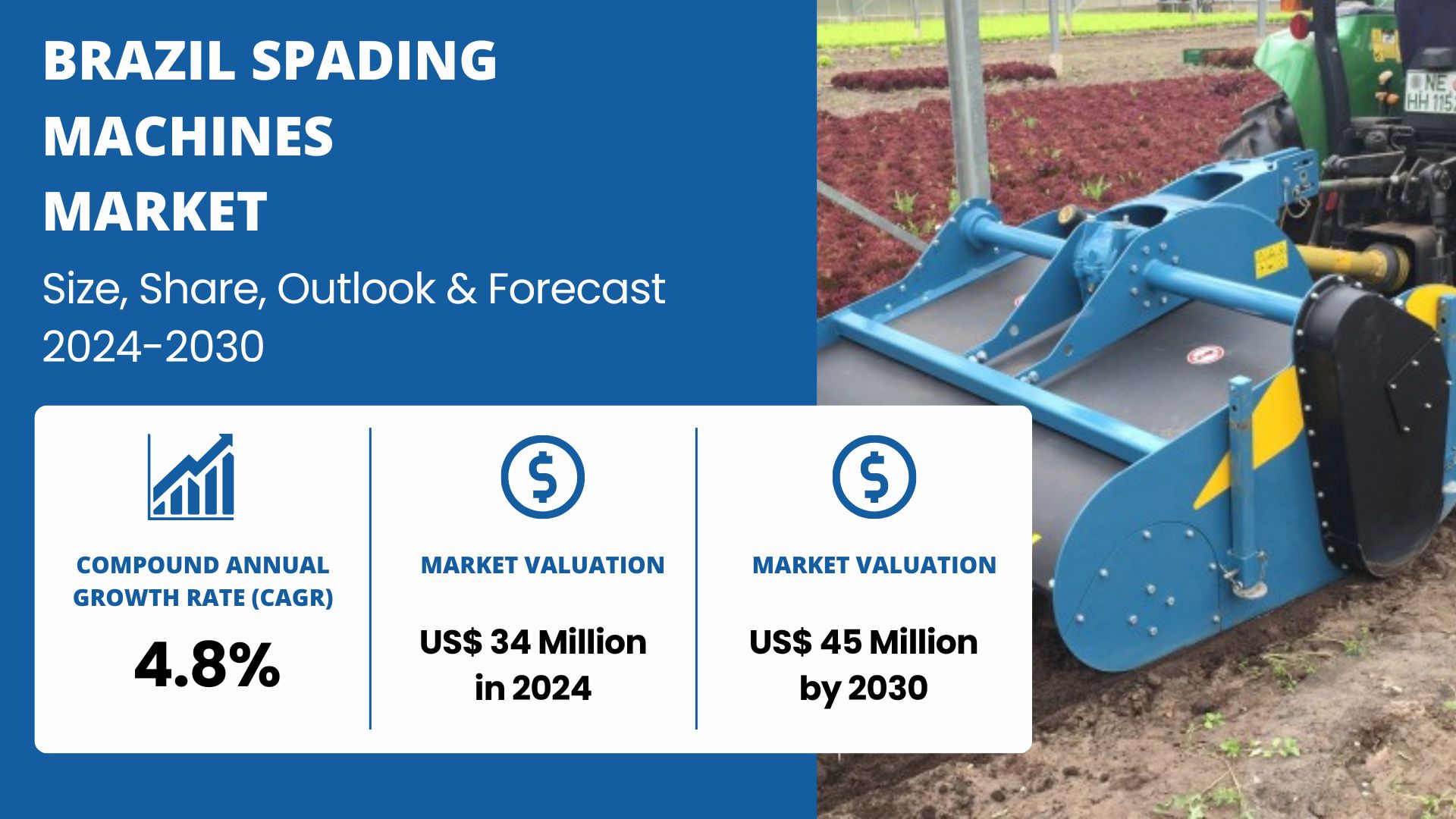TOP CATEGORY: Chemicals & Materials | Life Sciences | Banking & Finance | ICT Media
The "Brazil Spading Machines Market" size was valued at US$ 34 million in 2024 and is projected to reach US$ 45 million by 2030, at a CAGR of 4.8% during the forecast period 2024-2030.
Spading machines are agricultural tools used to turn and break up soil for planting. Unlike traditional plows, which cut through the soil and flip it over, spading machines dig and lift the soil in a way that maintains the natural soil structure. These machines are highly valued for their ability to prepare soil without compacting it, making them ideal for sustainable farming practices. In Brazil, spading machines are used to improve soil health in various crops, particularly in regions with more compacted or heavy soils.
Key Points:
Sustainable Soil Management:
Spading machines improve soil aeration and structure without causing excessive compaction. This leads to better water infiltration, root development, and nutrient absorption, all of which are crucial for high yields, especially in Brazil's diverse climate.
Growing Demand for Organic Farming:
Brazil has seen a growing trend toward organic and sustainable farming practices. Spading machines are favored in organic agriculture because they reduce soil disturbance, helping to maintain beneficial microorganisms and soil fertility.
Adaptation to Various Soil Types:
Brazil’s soil types vary greatly across regions, from clay-heavy soils to sandy loams. Spading machines are effective in working with these diverse soil conditions, making them versatile for Brazilian agriculture, particularly in regions like the Cerrado and the Amazon Basin.
Minimizing Soil Erosion:
By maintaining the integrity of the soil structure, spading machines help reduce the risk of erosion, which is a concern in Brazil due to the extensive agricultural expansion in areas prone to soil degradation.
Increased Crop Rotation Efficiency:
Spading machines allow for efficient soil preparation in between crop rotations, making them particularly useful for farms that plant multiple crops throughout the year, such as soybeans and corn, two of Brazil’s major exports.
Use in Horticulture and Specialty Crops:
Spading machines are widely used in Brazil’s horticulture sector, including the cultivation of fruits, vegetables, and coffee. The machines' ability to prepare soil delicately without overworking it is particularly important for these high-value crops.
Technological Advancements:
The market for spading machines in Brazil is seeing technological advancements, such as hydraulic spading machines that offer greater power and precision. Modern machines are also being integrated with GPS systems for better control and field mapping.
Regional Demand:
Demand for spading machines is high in areas where conservation tillage and sustainable soil practices are prioritized. States like São Paulo, Paraná, and Minas Gerais, which are major agricultural hubs, are significant users of spading machines.
Key Market Players:
Several international and local manufacturers are active in the Brazilian market, offering spading machines that cater to the specific needs of the country’s diverse agricultural sector. Companies also focus on providing durable equipment that can withstand Brazil’s varying climate conditions.
Challenges and Opportunities:
The spading machine market in Brazil faces challenges related to high upfront costs for small-scale farmers. However, government subsidies and incentives for sustainable farming are helping boost adoption. Additionally, as Brazil continues to expand its agricultural output, the demand for efficient soil preparation methods, including spading machines, is likely to grow.
In conclusion, spading machines are becoming an essential part of Brazil’s agricultural mechanization, particularly as the country focuses on sustainable farming practices, soil health, and productivity.

Spading machines are agricultural implements that use a series of rotating spades to dig, lift, and turn over soil, providing deep tillage and soil mixing without creating a hardpan.
Brazil's spading machines market is experiencing moderate growth, driven by increasing interest in soil health and sustainable tillage practices. In 2023, vegetable and horticultural crops accounted for 55% of spading machine use in Brazil, followed by small-scale grain production at 30%. The market saw a 10% increase in demand for PTO-driven spading machines in 2023, offering improved efficiency for smaller farms. Adoption of spading machines in organic farming systems is growing at 7% annually. Key manufacturers are focusing on developing lightweight, compact spading machines, with a 12% year-over-year increase in product launches targeting small to medium-sized farms. The industry is also witnessing a trend towards multi-functional spading machines, with a 15% rise in sales of implements combining spading with other soil preparation tasks. Brazil's diverse agricultural landscape and growing emphasis on soil conservation continue to drive spading machine adoption, with an 8% increase in sales to farms transitioning to reduced tillage systems.
This report contains market size and forecasts of Spading Machines in Brazil, including the following market information:
Report Includes
This report presents an overview of Brazil market for Spading Machines , sales, revenue and price. Analyses of the Brazil market trends, with historic market revenue/sales data for 2019 - 2023, estimates for 2024, and projections of CAGR through 2030.
This report focuses on the Spading Machines sales, revenue, market share and industry ranking of main manufacturers, data from 2019 to 2024. Identification of the major stakeholders in the Brazil Spading Machines market, and analysis of their competitive landscape and market positioning based on recent developments and segmental revenues.
This report will help stakeholders to understand the competitive landscape and gain more insights and position their businesses and market strategies in a better way.
This report analyzes the segments data by Type, and by Sales Channels, sales, revenue, and price, from 2019 to 2030. Evaluation and forecast the market size for Humidifier sales, projected growth trends, production technology, sales channels and end-user industry.
Key Companies covered in this report:
Including or excluding key companies relevant to your analysis.
The report also provides analysis of leading market participants including:
Key Indicators Analysed
Key Benefits of This Market Research:
Key Reasons to Buy this Report:
We offer additional regional and global reports that are similar:
Customization of the Report: In case of any queries or customization requirements, please connect with our sales team, who will ensure that your requirements are meet.